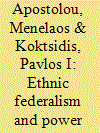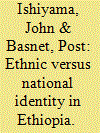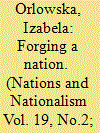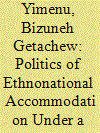|
|
|
Sort Order |
|
|
|
Items / Page
|
|
|
|
|
|
|
| Srl | Item |
| 1 |
ID:
175525


|
|
|
|
|
| Summary/Abstract |
This article examines why the emancipation of ethnic groups has failed to address ethnic conflicts in Uganda. Successive Ugandan governments, especially the current regime of President Yoweri Museveni, have attempted to end the country’s history of ethnic strife by creating separate constituencies, separate districts and separate kingdoms for marginalised ethnic groups to free them from the domination of powerful ethnic groups. Focussing on the Rwenzori area of western Uganda where ethnic violence is severest, I show how the approach of ethnic emancipation reproduces ethnicity as the basis for political inclusion and escalates rather than abates ethnic contestations. This study should shed more light on the challenge of ethnic federalism in other countries like Ethiopia and Nigeria.
|
|
|
|
|
|
|
|
|
|
|
|
|
|
|
|
| 2 |
ID:
148651


|
|
|
|
|
| Summary/Abstract |
Negotiations for the settlement of the Cyprus question have resumed amid a pressing geopolitical and economic reality. Greek and Turkish Cypriots adopt distinct interpretations of the United Nations – designated recipe for a bicommunal and bizonal federation in Cyprus. In the relative absence of major normative preconditions for settlement, including a lack of common vision and mutual trust, the pillar notions of federalism and consociationalism have been adapted to serve each side’s vital security concerns and to increase each side’s leverage in a future federal arrangement in Cyprus. This study conducted an opinion poll of young, educated Greek Cypriots to identify the preferred type of constitutional settlement in the context of a number of perceived motives, constraints, and preconditions. The findings of this survey reveal substantial consensus on the acceptance of a bizonal, bicommunal solution. Yet acceptance of a federal solution is subject to certain prerequisites. The study reveals the varying influence of current economic concerns on a prospective solution.
|
|
|
|
|
|
|
|
|
|
|
|
|
|
|
|
| 3 |
ID:
185513


|
|
|
|
|
| Summary/Abstract |
In this article, we examine the growth of ethnopolitical divisions in Ethiopia. Using recently released Afrobarometer data and comparing current levels of ethnonational identity with previous data released in 2013, we find an erosion in support for a national Ethiopian identity, and rapidly growing ethnonational identities among Oromo and Tigrayan respondents, but not Amhara. This suggests that the attempts by Prime Minister Abiy Ahmed to promote ‘Ethiopianess’ as a unifying principle for the country will face great challenges. In addition, although it is tempting to lay the blame for this growing ethnonationalism at the ‘feet’ of the ethnofederal system in Ethiopia (as many scholars have) this study cannot directly address the connection between ethnic federalism and ethnic conflict and instability. However, what is clear is that there is a growing sense of ethnonationalism (or the idea that ethnic identity is now more important than a national Ethiopian identity) for a significant part of the population and this is consistent with the expectations of the critics of ethnofederalism. This also suggests greater challenges to Ethiopian unity in the near future.
|
|
|
|
|
|
|
|
|
|
|
|
|
|
|
|
| 4 |
ID:
120370


|
|
|
|
|
| Publication |
2013.
|
| Summary/Abstract |
Due to a different calendric system, Ethiopia celebrated the turn of the millennium in September 2007. This paper investigates how Ethiopia's coalition government, associated by many Ethiopians with minority rule, set up and mobilised a year-long millennium project to propose new idioms of nationhood redefining Ethiopia's identity to deal with the challenges of ethnic federalism and to accommodate its multiethnic society. I argue that the millennium celebration sought to find a solution to the divisive effects of the politics of 'difference' derived from a policy of ethnic federalism, and to the existing outdated metaphors of nationhood rooted in Semitic culture and Orthodox Christianity. It proposed more suitable idioms of common identity based on the idea of 'unity in diversity'. This paper contributes to our better understanding of the role of symbolism, commemorative events and appropriation of the 'sites of memory' in the complex process of the transition of multiethnic societies into nation states.
|
|
|
|
|
|
|
|
|
|
|
|
|
|
|
|
| 5 |
ID:
193044


|
|
|
|
|
| Summary/Abstract |
Ethiopia is the most prominent example of the late 20th-century adoption of federalism to accommodate diversity and complete state-building. This article explores the implementation of federalism and accommodation of ethnonational diversity in dominant party regimes by using Ethiopia as a case. Drawing on legal documents, literature, news sources and government reports, the article argues that federalism enabled distinctive groups to promote their culture, use their languages and exercise self-rule in their territory. However, ethnonationalities’ constitutionally proclaimed self-determination rights and the practice rarely correspond. Although all ethnonationalities have the same constitutional rights, some are still subjugated, and self-rule remains their dream. The dominant party regime in Ethiopia met demands for self-rule and accommodation with suppression and violence. The constitution grants regions to use their legislative powers to accommodate region-specific demands; nevertheless, regions cannot operate out of the narrow framework of the federal ruling party. Thus, regions became repressive agents of the centre rather than genuine self-rule agents. Insights from Ethiopia have broader implications for states embracing federalism.
|
|
|
|
|
|
|
|
|
|
|
|
|
|
|
|
|
|
|
|
|